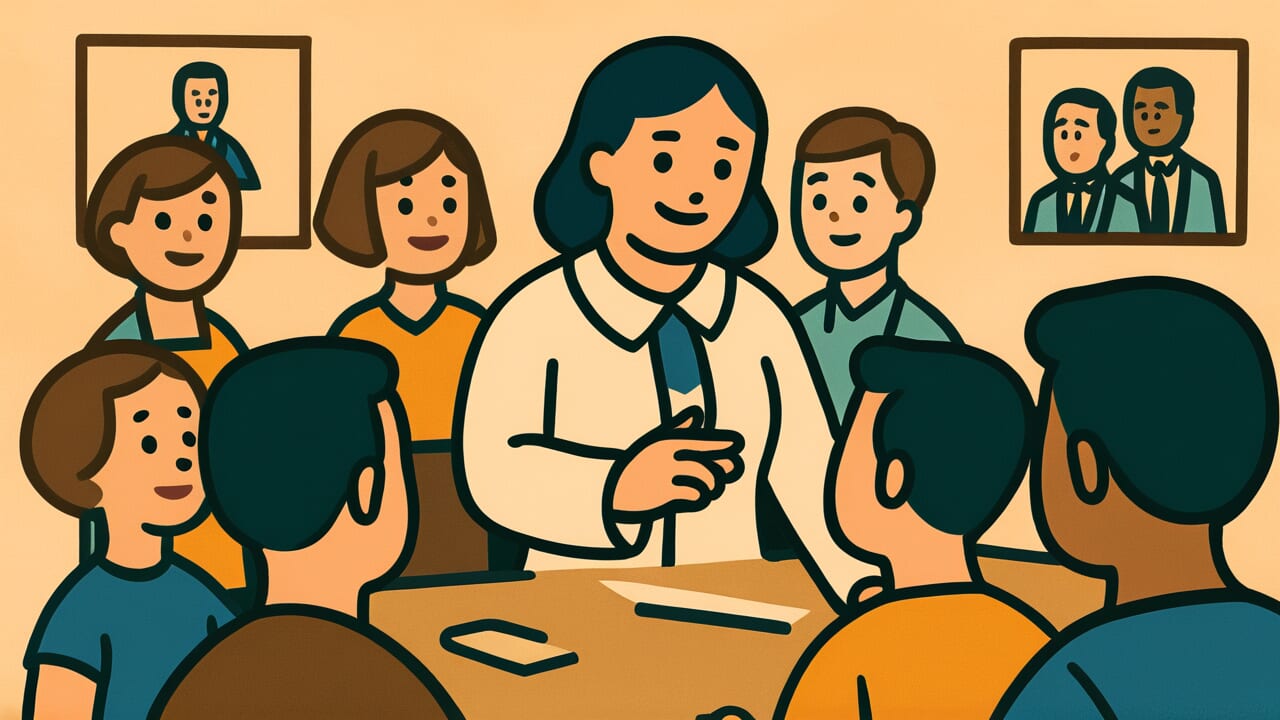How to Read “Teaching transforms people more deeply than commands”
Oshie no tami wo ka suru ya mei yori mo fukashi
Meaning of “Teaching transforms people more deeply than commands”
This proverb means that teaching and guiding people is a profound and noble act, as deep as risking one’s life.
The “teaching” here doesn’t just mean passing on knowledge or skills. It refers to the work of moral transformation that changes people’s hearts and guides them toward better paths.
The word “transforms” carries deep meaning. It’s not about superficial change but about transforming people from within.
People use this proverb when educators or leaders recognize the weight of their responsibility. It’s also used when teaching something important to help recognize the nobility and significance of that act.
The expression “more deeply than commands” shows that education isn’t just a job or duty. It’s a noble mission that supports the foundation of human society.
Even today, this phrase connects to the understanding that education’s essence isn’t just transmitting knowledge. It’s about character formation and passing on values.
Origin and Etymology
The exact source of this proverb hasn’t been identified. However, it’s believed to be strongly influenced by ancient Chinese thought, especially Confucian educational philosophy.
The expression “transforms” is a concept often used in Confucianism. It means fundamentally changing people’s hearts and actions, not just giving them knowledge.
Looking at the phrase “more deeply than commands,” the word “commands” here likely doesn’t mean just life. It refers to one’s mission or mandate from heaven.
In other words, teaching and guiding people is an act even more profound and important than the mission given to oneself. This reflects a philosophy that positions education as one of the noblest endeavors in human society, not just a profession or obligation.
In Japan, Confucian thought spread mainly among the samurai class from the Edo period onward. The importance of education became strongly emphasized.
As educational institutions like temple schools developed, such expressions likely emerged to explain the weight of responsibility and mission for those who teach. This phrase embodies the recognition that education is a deep endeavor involving character formation, beyond mere knowledge transmission.
Usage Examples
- As the saying goes, “Teaching transforms people more deeply than commands,” so I feel anew the weight of responsibility in the teaching profession
- Raising the younger generation is like “Teaching transforms people more deeply than commands,” so we must seriously engage with each individual
Universal Wisdom
Behind this proverb’s long transmission lies a fundamental truth. Human society cannot survive without education.
Unlike other animals, we humans cannot live by instinct alone. Language, morality, skills—we acquire everything by learning from someone.
In other words, the act of teaching is the most essential endeavor that makes humans human.
This proverb expresses “more deeply than commands” because education is an endeavor that transcends individual life and spans generations.
The influence one teacher gives to one student affects not just that student’s life. It chains to all the people that student will interact with in the future, and then to the next generation.
Teaching is an act of creating the future in invisible ways.
Also, truly changing people isn’t about giving superficial knowledge. You touch their hearts, believe in their potential, and guide them—sometimes strictly, sometimes gently.
For the teacher, it’s a deep human relationship that demands facing oneself and continuing to grow. That’s why our ancestors understood that teaching is a noble act worth risking one’s life for.
When AI Hears This
From an information theory perspective, education is a surprisingly inefficient process.
Commands are just one-way transfers of simple information packets. For example, the command “clean up” has only a few bits of information. It just writes a temporary action program into the receiver’s brain.
But transformation is completely different. You need to rewrite the other person’s entire thinking system.
The human brain has about 86 billion neurons, each forming complex networks. Education is the work of establishing new order patterns in this vast network.
However, biological systems constantly tend toward entropy increase—toward disorder. Knowledge you worked hard to teach gets forgotten without review. This is nature’s law.
Even more interesting is the information retention rate. According to cognitive science research, about 70 percent of information heard just once is lost after 24 hours.
Maintaining an orderly knowledge system requires multilayered energy input—repetition, contextualization, emotional connections, and more.
If a command is an instantaneous 1-bit transfer, transformation requires thousands of information packet transmissions and active reconstruction processes on the receiving end.
That’s why education needs tens of thousands of times more time and energy than commands.
Lessons for Today
This proverb asks us modern people what teaching really means. It’s not necessarily limited to the teaching profession.
Parents to children, seniors to juniors, friends to each other—we convey something to someone and influence each other every day.
This proverb teaches us that each of these moments is actually an important time shaping the other person’s life.
In modern society, information overflows and knowledge is easily available on the internet. But that’s exactly why the value of people directly teaching people stands out.
It’s not just information transmission. It’s the act of conveying enthusiasm, sincerity, and one’s very way of being human.
When you teach someone something, your seriousness and compassion reach them beyond words.
At the same time, this proverb suggests the mindset of the learner. When someone teaches you something, they’re pouring their time and heart into you.
By understanding that nobility and having a humble attitude to learn, the relationship between teaching and learning becomes deeper.



Comments